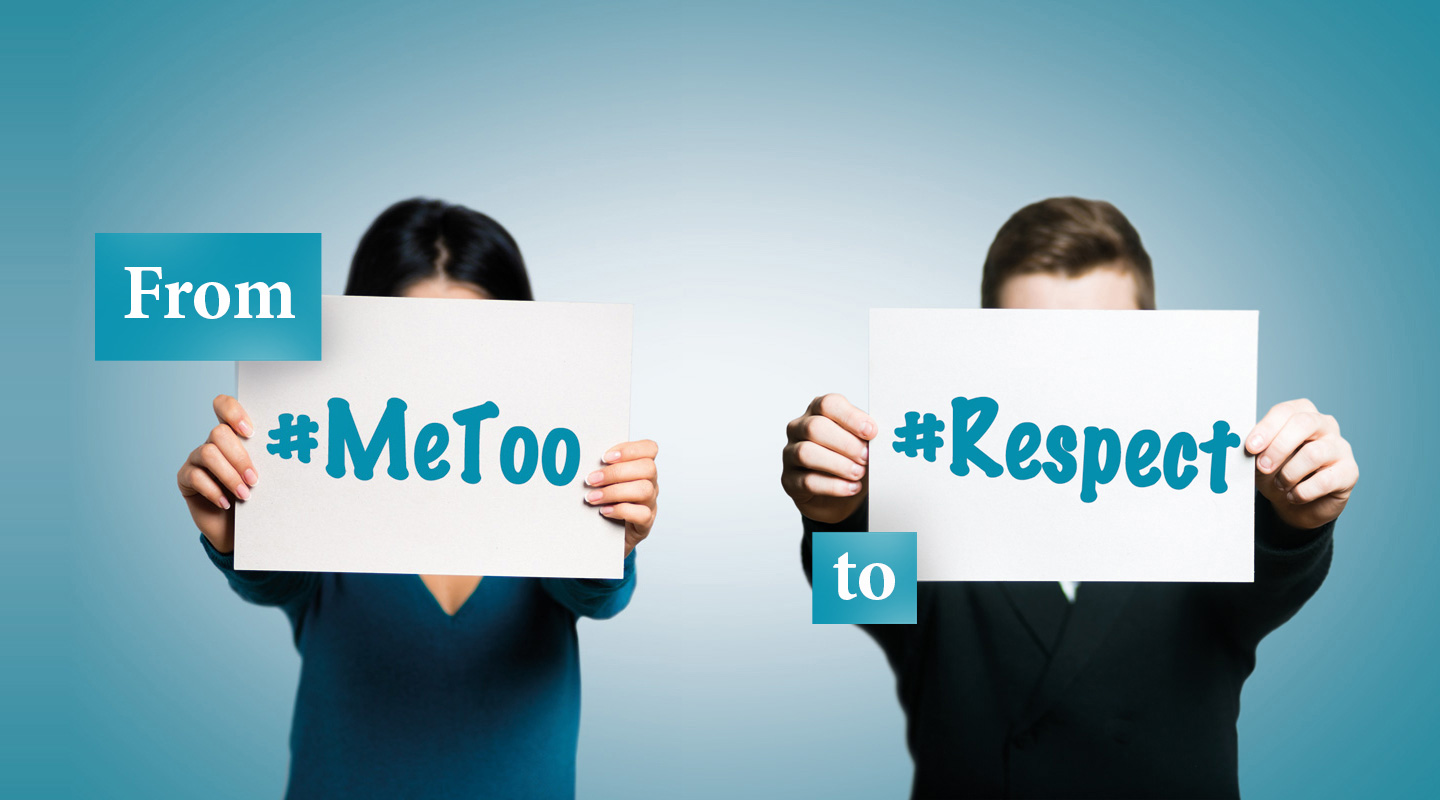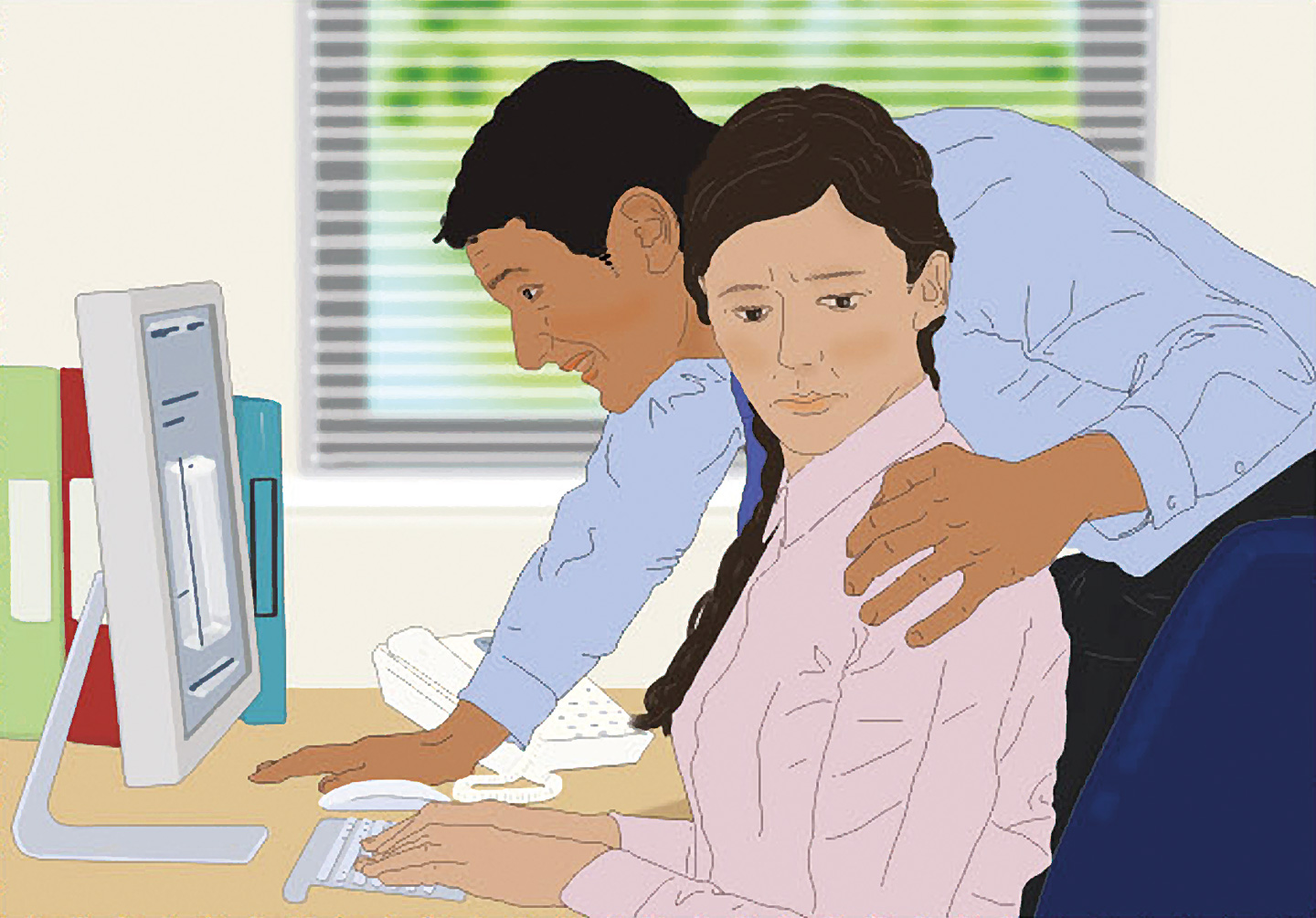Dear readers, With the launch of e-newsletter CUHK in Focus, CUHKUPDates has retired and this site will no longer be updated. To stay abreast of the University’s latest news, please go to https://focus.cuhk.edu.hk. Thank you.
From #MeToo to #Respect

Over the past months, ‘sexual harassment’ has captured the attention of people worldwide.
Last October, The New York Times and The New Yorker disclosed the alleged serial sexual harassment and assault cases perpetuated by Harvey Weinstein, American film producer, over the past 30 years. Later, actress Alyssa Milano urged women who were sexually harassed or assaulted to use #MeToo on Twitter to share their experiences. The American Olympics gold medal gymnast McKayla Maroney then openly accused the national team doctor Larry Nassar of sexually molesting her since she was 13. One hundred and fifty-six women testified against Nassar, and in January, he was handed a jail sentence of 175 years.
As of early December 2017, over three million #MeToo posts from more than 80 countries were found on social media platforms. Later that month, the Time magazine named the ‘Silence Breakers’ as ‘Person of the Year’, paying tribute to 61 persons of different genders, sexual orientations and ethnicities who stood up against sexual harassment or assault.
Recently, 18 women accused Jean-Claude Arnault, whose wife is a Swedish Academy member, of sexually assaulting them, leading to the Academy’s announcement on 4 May that the Nobel Prize for Literature would be withheld this year.
Ripples in Hong Kong
Last November, Hong Kong hurdler Vera Lui posted on Facebook the allegation that she had been sexually assaulted by her former coach. She got 47,000 responses and won the support of many. The Chief Executive pledged that the government would take the matter seriously, and the coach was arraigned subsequently. However, her revelation has not detonated a bomb as big as that in the West.
Prof. Anthony Fung, a member of the Education and Training Unit of the Committee Against Sexual Harassment (CASH) of CUHK, said, ‘The awareness against sexual harassment takes a long time to nurture. Hong Kong is a predominantly Chinese society where gender concepts are conservative or even out-of-date. There is still much secrecy surrounding sexual assaults against women. For that reason, the victims may be under greater pressure than those in the West.’

Professor Fung added that sexual harassment prevention stresses the awareness and proper execution of one’s rights. ‘Rights don’t give us the license to offend. Everyone should enjoy autonomy on sex, privacy, and personal as well as actual space.’
Starting from Respect
The Chairperson of CASH, Prof. Diana Lee, said, ‘If one’s personal space is a circle, then how to draw that circle is one’s right. One’s circle may overlap with others’, but what’s outside of the overlapping area should be off-limits. People should have a clear idea of where these boundaries lie, and should respect other people’s boundaries. To forcibly cross these boundaries means giving free rein to one’s desires and imposing one’s will over another’s, which is a breach of respect and may lead to harassment and assault.’
The year-long Respect Awareness Campaign, launched on 21 March to raise the University community’s awareness of the importance of mutual respect and anti-sexual harassment, is based on the concept of a gender-equal and harassment-free campus. As Vice-Chancellor Prof. Rocky S. Tuan said at the kick-off ceremony, ‘CUHK embraces diversity, and diversity must be built on mutual respect and equality.’ Starting from May, Professor Lee will start visiting the Faculty offices, College assemblies, and professional and administrative services units to explain the objectives of the campaign and the University’s policies on anti-sexual harassment. In the months to come, the Committee will organize a series of seminars, film screenings, and drama performances on respect and anti-harassment, in addition to panel displays in the Cultural Square, libraries, and Colleges.

After Nassar’s victims lodged their complaints with the USA Gymnastics (USAG), what they received at first was not sympathy and assistance but cynicism and ridicule. Besides not wanting to get into troubles, the USAG staff might not have the knowledge of the seriousness of the matter or how to deal with it. Professor Lee said, ‘At a university, the department and unit heads and the deans are the first persons most victims turn to for help, and how they respond is crucial. The Committee will launch a revised online training course. I hope all staff with supervisory duties will enrol in the course. I am sure that, for the sake of a harmonious campus, they won’t mind taking the time to complete the course.’
Professor Lee said the rule of thumb for defining sexual harassment is whether a reasonable person would find the act in question unacceptable under the circumstances. Professor Fung remarked that contextuality counts. ‘Where there are grey areas, there should be communication. Classmates need to communicate, and so do friends, teachers and students, supervisors and subordinates, and even spouses and people in love. Most importantly, communication is two-way and should not be discouraged by differences in social class, position, and power. In other words, communication is a sign of equality and respect,’ said Professor Fung.

Wake-up Calls for Some
#MeToo has awakened in some the long-buried memories of what might pass for sexual harassment. Since last September, the number of enquiries received by CASH has increased by 50%, compared with that in the same period of the previous year. So has the number of cases for investigation and conciliation. Professor Lee said, ‘At the material times, the victim, either because of age or other reasons, might not know how to react. But the mental trauma could linger on. If it can be handled well, the victim may be able to drive away the demons, put it all behind and move on with his/her life.’
#MeToo has gone viral, but not without contrary opinions. Some consider it a witch hunt that preys on the emotions of the public, while some call it a type of swift justice, asking why it can bypass or even supersede the law. In January, 100 French women issued an open letter condemning #MeToo as a puritanical overreach that stands in the way of sexual freedom. And some in Hong Kong accuse Vera Lui of being a copycat of the movement.
Professor Fung said, ‘It is right to detest sexual harassment and assault, but there are grey areas. While the law may not be adequate, resorting to social media is not the only way to solve the problem. We don’t have to rush to a conclusion on #MeToo, but undeniably this movement has empowered the victims and given them hope. The perpetrators may be people in power, but their victims are not necessarily powerless. Their voices still count.’
It will be nice to see that someday, what goes viral on our social media is ‘#Respect’ with stories on mutual respect.
This article was originally published in No. 518, Newsletter in May 2018.